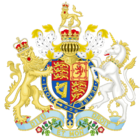- This page was last modified on 5 June 2025, at 08:05. Suggest an edit.
Admiralty Powers, &c. Act 1865 facts for kids
| Act of Parliament | |

|
|
| Long title | An Act for consolidating certain Enactments relating to the Admiralty. |
|---|---|
| Citation | 28 & 29 Vict. c. 124 |
| Dates | |
| Royal assent | 6 July 1865 |
| Other legislation | |
| Amended by | Crown Proceedings Act 1947 Theft Act 1968 |
|
Status: Repealed
|
|
| Text of statute as originally enacted | |
The Admiralty Powers, &c. Act was a law passed by the Parliament of the United Kingdom in 1865. It became official on July 6, 1865, when it received royal assent (the King or Queen's approval). This Act was important for how the British Navy and its dockyards were managed.
Contents
What Was the Admiralty Powers Act?
This law gave special powers to the admiral-superintendent at every dockyard. A dockyard is a place where naval ships are built and repaired. The admiral-superintendent was like the boss of the dockyard.
New Powers for Dockyard Bosses
The Act made these admiral-superintendents into a type of judge, called a justice of the peace. This meant they could handle certain legal problems right there in the dockyard. They could hear cases about specific crimes and issues related to the Royal Navy and its supplies.
This power allowed them to deal with cases brought by the dockyard police. At the time, these police were part of the Metropolitan Police (London's police force). It helped keep order and solve problems quickly within the naval dockyards.
Other Important Parts of the Act
The Act also covered other important topics:
- It set out punishments for people who tried to trick others by pretending to be naval sailors. This is called impersonation.
- It also dealt with forgery, which is making fake documents.
- The Act made it clearer how the Board of Admiralty (the group that ran the Royal Navy) would be involved in legal actions.
- Finally, it created a system for reporting new rules related to the Act. It also set a date for the Act to officially start and gave it a short name.
Why Was the Act Changed or Removed?
Over time, laws need to be updated or removed. Parts of the Admiralty Powers Act were later changed or "repealed." When a law is repealed, it means it is no longer in effect.
For example, some sections of the 1865 Act were repealed by the Crown Proceedings Act 1947. This new law changed how people could take legal action against the government. Later, the Theft Act 1968 repealed the sections about forgery and impersonation. This is because the new Theft Act covered those crimes in a more modern way. Eventually, the entire Admiralty Powers Act was repealed, meaning it is no longer a current law.
